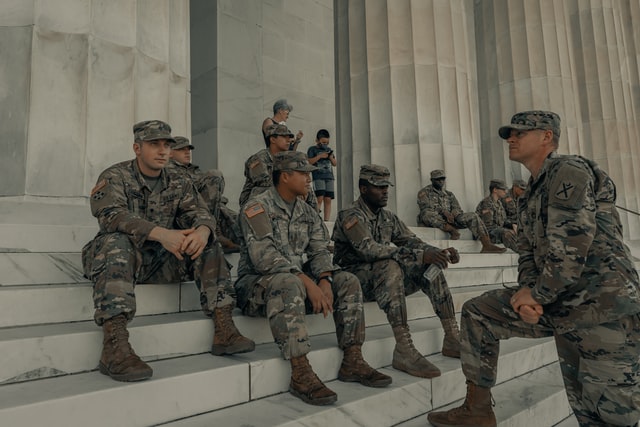Use military skills to jump-start your civilian career. How can you apply your dynamic military skill set in a new context?
For many transitioning service members, resume writing is a significant hurdle. How do you translate years of military experience into civilian terms?
When pursuing a major life or career change, it’s normal to experience self-doubt or even imposter syndrome. But remember, your next job isn’t your first job. Your military career has equipped you with a versatile skill set that will appeal to potential employers across a variety of industries.
With this in mind, it’s important for your resume to highlight the many skills you honed during your years of service and demonstrate how those abilities will translate to new contexts. In other words, you have to emphasize your transferable skills.
What are common examples of transferable skills? Why should veterans care about them? In this blog post, we’ll answer these questions and detail how transferable skills can help you land a lucrative job in Indiana.
What are transferable skills?
Transferable skills are talents or abilities acquired through previous employment or training that are useful in a variety of industries and career paths. Both hard skills, or teachable and easily quantified abilities that help you carry out job-specific tasks, and soft skills, or non-technical, interpersonal abilities, may qualify as transferable skills. Evaluating military experience and identifying transferable skills is crucial for all transitioning service members. Highlighting these skills in your resume shows employers that—although you may not possess industry-specific experience—you have the expertise necessary to thrive in a new position.
What are examples of common transferable skills for veterans?
Not all veterans possess the same transferable skills, but military training typically requires service members to develop some of the following abilities.
Adaptability
Military experience prepares service members to quickly adjust to new responsibilities and new environments. I’m sure you can remember multiple times where orders changed more times than you can count. Employers love to hire flexible candidates for roles that require on-the-job training; adaptable employees can handle new projects and efficiently multitask.
Communication
Having been drilled in disciplined, respectful communication strategies throughout their military tenures, many service members are able to calmly and effectively navigate interpersonal conflict in the workplace. Your experience in talking on the radio, for example, taught you how to deliver the most important message in a concise manner. This type of communication is paramount in relaying information to civilian managers.
Leadership
The hierarchical structure of the military rewards strong leadership skills, which are incredibly valuable for veterans who aspire to management or supervisory roles. Veterans with sharp leadership abilities often possess other transferable skills from this list, such as communication, planning, and teamwork skills. Many times, you may have even found yourself leading sideways (leading your peers). In civilian roles, these individuals are able to establish and communicate clear objectives and then rally teams to meet their performance goals.
Planning
Attention to detail and strict adherence to plans aren’t optional in the military. That’s why many service members are able to quickly form an effective strategy and follow through on their plans, making them strong fits for project management and executive roles. You’ll be surprised at how closely aligned project management decision making follows the Military Decision Making Process (MDMP).
Teamwork
Service members don’t accomplish missions alone. Your unit’s success is only as good as your lowest common denominator, which is why we push our lowest performing teammates harder. Military experience promotes collaboration and mutual support, making veterans excellent team members.
Including transferable skills in your resume
Before you draft your resume, consider which types of jobs you want to pursue and what skills qualified candidates will need to succeed in those roles. If you’re having a hard time identifying specific abilities, review active job postings for those positions or network with veterans who currently hold those positions. Think about these position-specific skills. Do they overlap with your personality, interests, and military experience?
To highlight your relevant skills, include a skills section in your resume. Doing so simplifies the review process for recruiters and hiring managers, as they can quickly scan your resume for key requirements. As you draft your resume, remember to only list skills that pertain to your desired position and avoid generalizations. For instance, if you’re interested in positions in the technology sector, focus on specific technical proficiencies you gained during your military career.
While including a skills section allows you to quickly and efficiently list your strengths, this section will only give recruiters a cursory overview of your talents. In other words, don’t just list your skills and then call it a day! Be sure to demonstrate how you’ve used these skills to deliver results in the experience section of your resume.
Possibly most importantly, cater your resume to each job that you’re applying for. You’ll be applying to multiple roles, so you should have multiple versions of your resume. Make sure your skills that are highlighted in each one are skills that the role are looking for. Great resumes are fluid, they can’t be one size fits all.
Helping veterans connect with Indiana employers
As you approach your military transition, remember that you don’t have to navigate this difficult process on your own.
INvets was created by veterans, for veterans. Although our primary objective is to connect transitioning service members with Indiana employers, we do more than curate job listings and arrange interviews. From providing valuable education and training to explaining Indiana’s many financial incentives for veterans, we’re committed to helping armed forces members find meaningful career opportunities after leaving the military.
If you need additional support throughout your transition to civilian life, register for an INvets account. One of our veteran engagement specialists will reach out and help you plan your next move.
